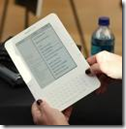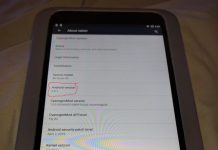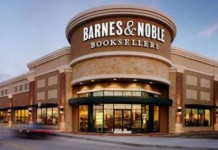 B&N’s Nook and Sony’s new wireless e-reader have yet to make it to the stores. But guess what is available, got a recent software upgrade and probably would be doing well anyway because of the number of books available for it and the growth of e-books in general. Surprise of surprise, Amazon says this month has been the best one ever for Kindle sales.
B&N’s Nook and Sony’s new wireless e-reader have yet to make it to the stores. But guess what is available, got a recent software upgrade and probably would be doing well anyway because of the number of books available for it and the growth of e-books in general. Surprise of surprise, Amazon says this month has been the best one ever for Kindle sales.
Amid the hype, Amazon didn’t share a trifling little detail, the actual unit sales numbers, but it did say the K-machine is “the #1 bestselling product across all product categories on Amazon.”

































Over at ABCNews.com they just discovered ebook readers. They have a video report introducing the concept.
http://abcnews.go.com/Technology/AheadoftheCurve/techbytese-reader-explosion/story?id=9187279
Buried halfway through it is a comment about 3 million sold this year alone. (Presumably that mean, “so far”.)
That would put Kindle sales at about two million for 2009 and total installed base about three million.
A good ramp-up but a ways to go to get even remotely close to where media players (200 million-plus per year) are after 10 years on the market. 😉
Amazon had better maximize their bragging rights now, before the rush of new e-readers steals their market share. My academic colleagues are less interested in the Kindle than the forthcoming Nook, the next generation iPhone, the Plastic Logic device, the txtr, the Entourage eDGe, and the possible Apple iTablet — which should come with a (foldable) unicorn’s horn on its top section, because it may be a mythical beast.
It is going to be a battle to the death: May the gods save us from future format wars, and may the best — not the most hyped — e-reader win.
Saw an ad for the Kindle on TV this morning, first I’ve ever seen. At first I thought it was for Target — lots of red, fast-paced, etc. Made me wonder whether it was because Kindle sales were sagging, or just trying to whip up the Christmas gift-giving. Maybe a little of both, given the competition this season.
I like your list, Betsy Garret. I suspect the certified-genuine unicorn horn is going to be a big feature of the Apple products. It may also explain the delays getting it into market.
That said, I think we have reached a point where Kindle sales will be driven less by hardware features than the bookstore behind it.
In other words, the purchase decision tree will come down to, first: Amazon or Adobe lock-in. Then, having selected your poison of choice, figuring out the hardware feature set of the adobe crowd.
Most of the griping moving forward will be along the lines of:
On the Kindle front: “Why doesn’t Kindle have such-and-such feature?”
On the adobe front: “Why don’t they match the Amazon bookstore?”
On the Apple front: “Its going to cure cancer! Just wait til next year. Its coming. Really!”
(Mondays are weird, okay?) 😉
Gizmodo assesses Amazon’s claim here:
http://gizmodo.com/5415219/kindle-outsells-every-other-product-on-amazon-and-what-this-really-means
Felix, I like your perspective: you are thinking bigger than just the hardware, the e-reading devices. There is:
the device (Kindle, Nook, … ) and
the bookstore behind it.
Is there also, or will there be, a third factor:
“the reading experience” ?
What has frustrated me so far — why I haven’t bought an e-reader — is that I can’t find what I need. I don’t really care if I pay a dollar more for the ebook. I need text to speech; and I need to do more with the files than just read: highlight, copy, paste — for research purposes, not evil ones.
So my question is: What is the difference between reading an ebook:
1) on the Kindle, bought from the Amazon bookstore, or
2) on a Nook, bought from the B&N bookstore, or
3) on the iPhone, bought from somewhere ?
(There may be other scenarios to compare: reading an Amazon ebook on my Mac desktop; and reading a Barnes & Noble ebook using Adobe Digital Editions on my Mac desktop.)
Is it all just text on the screen? …
Or does, for example, reading a DRM-ed EPUB on the Nook, give me more features that I can use for my work?
Advance thanks for any insights into this trilemma!
Betsy; try this model to see if it helps you:
There is a information use spectrum for most forms of data that ranges from pure consumption at one extreme to total editorial control at the other.
Treeware and its electronic equivalent, PDF, are purely for end-user consumption and offer zero access to the information other than eyeballing it.
At the other extreme you have fully open documents that openly offer up all their information for quoting, editing, sorting, calculating or whatever.
Ebook readers, of course, reside in between these two extremes but *today* they skew mostly towards the consumption side (hence their primary value as a mass product is for consumer-level ebooks). Technical and academic users seem to demand/require more. At present, except for, maybe, the Brother ebook reader there are no products that target this institutional market. This may change (or not) with the dual pane Asus ereader or if the Microsoft Courier ever reaches market in some form.
Rather than waiting for the magic unicorn, or some future generation academically-focused reader (they’re coming, just not soon) your needs be better served by a device with more of a skew towards the creation/manipulation side of the spectrum; a PC. Notjust any PC, though; you may want to take a look at the slate-format tablet PCs on the market today. (Dynamism.com is a nice place to window shop these products) You’ll find 5,7, and 9″ LCD-based tablets running x86 windows (XP or Win7) that are guaranteed to meet your needs today. Just add OneNote and any or all the PC-based ebook reader apps out there (Adobe, Amazon, B&N, Sony, MS, FBreader, Coolreader, Acrobat, whatever).
No lock-in.
Whatever book you find, wherever you find it, will be readable. Now, text-to-speech will still be an issue with DRM’ed material but if you can find a way to bypass those restrictions there are excellent TTS tools on the PC side. I’m rather impressed with the ATT Natural Voice options on TextAloud or other Windows-based TTS system:
http://www.nextup.com/attnv.html
(Serious TTS use these days, sadly, starts with DRM removal and then moves on to format conversion.)
The only downsides are price (closer to $600 than $300) and battery life (hours instead of weeks).
Beats waiting for the unicorn, though.
Hope that helps…
Yasu, Betsy: welcome to TeleRead.
Felix has answered your question very clearly and insight-fully, as he usually does. And I agree that if you want to find a device now, for academic purposes, then a Tablet PC may suit you far better than a Kindle or a Nook.
Unfortunately (for students, scholars, and business-persons) the kind of word-processing power that you need is not now in the marketing Zeitgeist of the ebook device manufacturers; and is not in the great scheme of the major book publishers. Sometimes, a rare wave of cynicism washes over me, and I imagine that ebook reading devices are a ruse, designed (along with DRM) for the underlying purpose of preventing people from stealing the content. Ebook reading devices prevent the infallible, unstoppable, instantaneous ebook pirating weapon: the humble screen capture. (I do not know if screen captures are possible when reading an Amazon-purchased ebook on your PC, using “Kindle for PC”.)
So, yeah, go with Felix’s suggestion if you need something now or in the very near future.
If you decide to wait for the more ideal ebook reading device, then I have a suggestion for half of your problem: your need for text to speech. Most ebook reading devices do not support TTS. However, there’s a new feature in Snow Leopard that allows you to turn any text file into an audio book, narrated by a decent-sounding computer voice (such as “Alex” or “Lucy”) — one click and you’re done. Then you can convert this iTunes AAC file to an MP3 file, and then play this MP3 on many ebook reading devices.
Apple has promised that we will see the iTablet before we spot a unicorn; but after a few glasses of high-octane Athenian raki, you will see the unicorn first.
Michael “Zorba” Pastore
50 Benefits of Ebooks
Athenian raki, huh?
I’ll have to track some one of these centuries.
As for converting document files to digital audiobooks; well, that is precisely what TextAloud and several other PC apps do. Today. Do there’s still no reason to wait for the unicorn. 😉
As for screen-capturing ebook readers, it turns out the Pocketbook 360 lets you do that. It also has extensive note-taking capabilities. Not sure I’d want to screen-scrape and ocr a lot of text with it but it should be doable.
I’ll have to give it a try and report back.
I can’t determine if this website is legitimate — the bare bones of it makes me suspicious:
http://www.onyxboox.com/
… but this video about the Onyx Boox ereader is impressive, with many features including text to speech and PDF highlighting.
The presence of this video might mean that the Onyx Boox ereader will be available in the USA soon. Or, not so soon.
Michael Pastore
50 Benefits of Ebooks